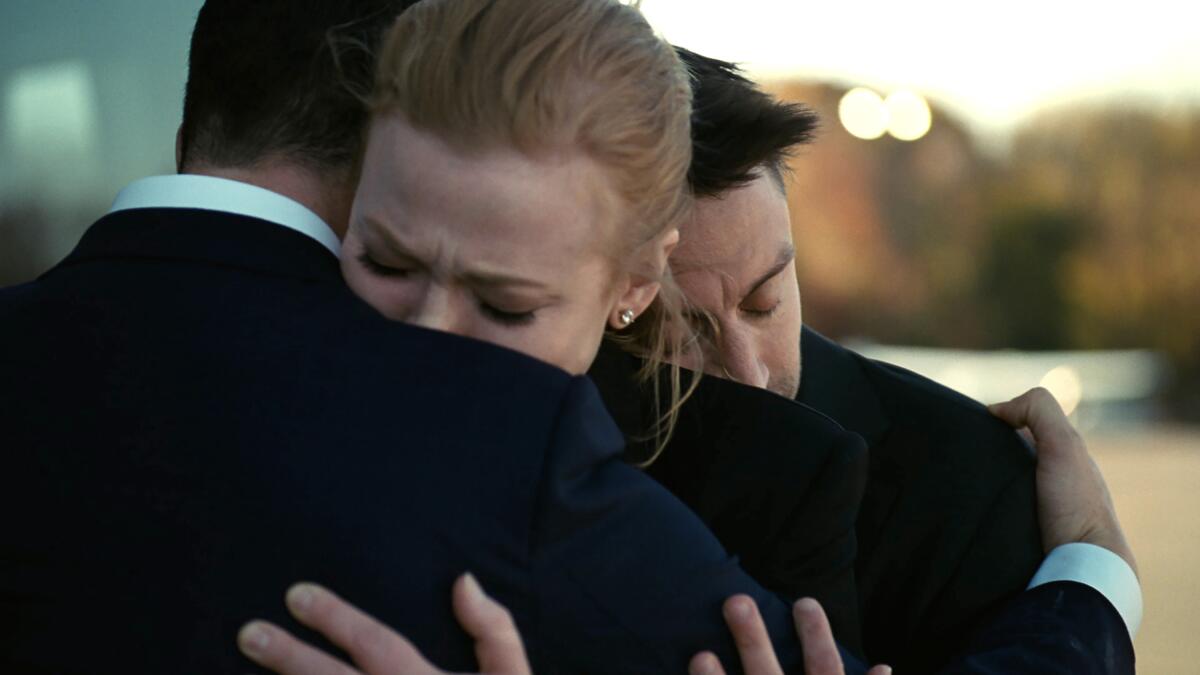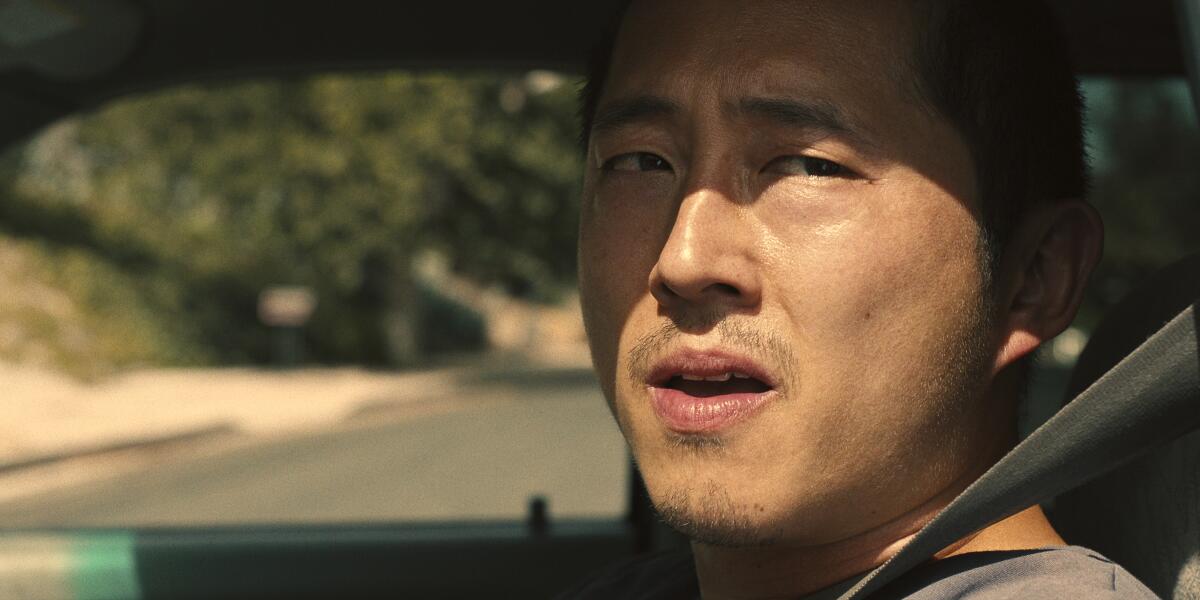Sign up for The Envelope
Get exclusive awards season news, in-depth interviews and columnist Glenn Whipp’s must-read analysis straight to your inbox.
You may occasionally receive promotional content from the Los Angeles Times.

I’m more partial to the collective experience of moviegoing than sitting on my couch watching and streaming TV, but there are occasions when I’ve been thankful for the relative invisibility that home-viewing provides.
If an episode of television wrecks me, like the tender love story between Bill and Frank (beautifully played by Nick Offerman and Murray Bartlett, an instance that needs to produce an Emmy tie) in the “The Last of Us” installment titled “Long, Long Time,” I don’t have to hide my tears surrounded by people in the darkness. I can just let it out and then wallow in the Linda Ronstadt song that gave the episode its name, listening to it over and over again while I ponder the importance of human connection. (Not to mention the wonder of Ronstadt’s voice.)
Is there anything better than a piece of great writing like “Long, Long Time”? Popsicles and puppy dogs, maybe. But outside of that, not much. You know it. I know it. About the only people who don’t know it — or don’t want to admit they know it — are the studio executives who’d rather see writers — and actors — starve than pay them a fair wage for their work.
So as final Emmy voting is about to get underway — for a ceremony that likely won’t happen for months — let’s salute the writers who have given us art that has thrilled, moved and transported us this past year. And after that ... get everyone back to work.

DRAMA
“Andor,” written by Beau Willimon; episode: “One Way Out”
“Bad Sisters,” written by Sharon Horgan; teleplay by Dave Finkel and Brett Baer; episode: “The Prick”
“Better Call Saul,” written by Gordon Smith; episode: “Point and Shoot”
“Better Call Saul,” written by Peter Gould; episode: “Saul Gone”
“The Last of Us,” written by Craig Mazin; episode: “Long, Long Time”
“Succession,” written by Jesse Armstrong; episode: “Connor’s Wedding”
“The White Lotus,” written by Mike White; episode: “Arrivederci”
Shows employ different strategies in submitting Emmy episodes for writing and directing. The producers of “Better Call Saul” like to offer up pretty much everything. This year, they submitted five of the final season’s six episodes, excluding only the Vince Gilligan-written penultimate installment, as Gilligan didn’t want to diminish the chances of the other writers. That episode, “Waterworks,” which, among other things, tracks Kim’s life after leaving Jimmy — ranks as one of the show’s finest, meaning it’s one of the best hours in television history. But the nominated episodes, which began and ended “Saul’s” final season, are right there with it.
“Succession,” meanwhile, likes to keep things simple for voters, submitting only “Connor’s Wedding,” the episode that changed the landscape of this landmark series, leaving Logan behind and surveying the shock and grief that followed. If you watched it, you were changed. That sounds like hyperbole, but “Connor’s Wedding” burrowed into conflicted feelings of loss in ways that were both highly specific and devastatingly universal. We knew Logan’s death was coming (the show’s title is a dead giveaway), but the moment still felt like a gut-punch. Remember Colin on the tarmac? That was all of us.
It’s unfair to compete with these shows. But that doesn’t mean the other nominees aren’t worth celebrating: “The Prick” established the family dynamics of “Bad Sister” in a way that made you want to binge-watch the series. The “Andor” finale was exquisitely written. (Luthen’s monologue on what he has sacrificed had a gravitas at odds with what “Star Wars”-related shows have doled out for decades.) White won last year for writing, directing and producing the first year of “The White Lotus,” and, with “Arrivederci,” he (thank God) landed the second season with more finesse than Tanya plummeting into a dinghy.
Should win: “Connor’s Wedding”
Will win: “Connor’s Wedding”

COMEDY SERIES
“Barry,” written by Bill Hader; episode: “wow”
“The Bear,” written by Christopher Storer; episode: “System”
“Jury Duty,” written by Mekki Leeper; episode: “Ineffective Assistance”
“Only Murders in the Building,” written by John Hoffman, Matteo Borghese and Rob Turbovsky; episode: “I Know Who Did It”
“Ted Lasso,” written by Brendan Hunt, Joe Kelly and Jason Sudeikis; episode: “So Long, Farewell”
Perhaps the most delightful surprise of this year’s Emmys came with the recognition for “Jury Duty,” the Amazon Freevee docuseries that followed a volunteer juror unaware that the documentary he signed up for was completely staged. What could have been a gimmick that turned stale after a couple of episodes became instead a consistently inventive and delightful series. Voters loved “Ineffective Assistance,” saluting the episode across multiple categories, nominating James Marsden — playing a heightened version of himself — for his work (and enthusiastic bed jumping) in it as well. I know I’ll never hear the word “soaking” the same way again.
Joining “Jury Duty” is a series-ending episode, the satisfying tying up of “Ted Lasso” loose ends, and a series-beginning installment, the thrilling table-setter of “The Bear” that introduced us to the kitchen characters we’ve come to know and love. These episodes were each series’ sole submission. Although you can’t argue with the results, I’m more partial to “The Bear’s” later first-season work (including “Review,” the chaotic 20-minute episode that earned Storer a directing nod) and “Sunflowers,” the “Ted Lasso” hour that gave us two great pairings — Rebecca and her Dutchman and Jamie and Roy recreating the bicycle scene from “Butch Cassidy and the Sundance Kid.”
“Wow” is another series finale, taking its title from Barry Berkman’s final words — the same verbal reaction I uttered aloud about a dozen times during “Barry’s” extraordinary — and, at times, vexing — last season. (I still don’t understand how Stephen Root wasn’t nominated for supporting actor.) And, as you might guess from the title, “I Know Who Did It” ended the “Only Murders” second season — the show returns this month — in a smart, satisfying fashion, exactly what you’d expect from this consistently enjoyable series.
Should win: “System”
Will win: “So Long, Farewell”

LIMITED OR ANTHOLOGY SERIES/MOVIE
“Beef,” written by Lee Sung Jin; episode: “The Birds Don’t Sing, They Screech in Pain”
“Fire Island,” written by Joel Kim Booster
“Fleishman Is in Trouble,” written by Taffy Brodesser-Akner; episode: “Me-Time”
“Prey,” written by Patrick Aison, story by Dan Trachtenberg
“Swarm,” teleplay and story by Janine Nabers, story by Donald Glover; episode: “Stung”
You have to go back to 2015 for the last time two TV movies made the cut in this category, a signal of a disappointing year for limited series, along with voters’ appreciation for Booster’s queer spin on “Pride and Prejudice” with “Fire Island” and the way “Prey” found a way to fashion a smart, scary addition to the “Predator” franchise.
I didn’t know until now that the “Beef” premiere took its title from something filmmaker Werner Herzog was heard to say in the documentary “Burden of Dreams,” which chronicled the turbulent making of “Fitzcarraldo” in the jungles of Peru. It makes perfect sense for a series in which deprivation and desperation figure prominently. And now I want to watch “Burden of Dreams” again.
I also want to revisit “Me-Time” at some point, the penultimate “Fleishman” episode that upended everything we thought we knew about Claire Danes’ character and, better, redefined our ideas about what it is to be a working mother. Its nuanced depiction of a woman in turmoil — postpartum depression combined with trauma from her own childhood along with mixed emotions about what feels truly meaningful — was devastating.
“Swarm” was wild and weird and left too many unanswered questions, but I’m happy it earned a nomination for its horrifying opening episode and for its lead Dominique Fishback. Nabers wanted “Swarm” to give Black writers the freedom to feel unafraid to tackle any subject matter and “tell it in as punk a way as possible.” On that count, the series nailed it.
Should win: “Me-Time”
Will win: “The Birds Don’t Sing, They Screech in Pain”
Sign up for The Envelope
Get exclusive awards season news, in-depth interviews and columnist Glenn Whipp’s must-read analysis straight to your inbox.
You may occasionally receive promotional content from the Los Angeles Times.